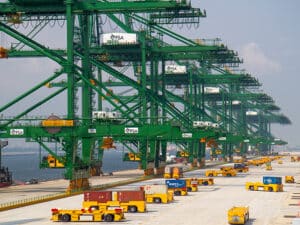
Op-Ed: Safer maritime battery technology
Written by Heather Ervin
Mukesh Chatter, Founder and CEO, Alsym Energy
By Mukesh Chatter, Founder and CEO, Alsym Energy
Reducing insurance costs and decarbonization goals are driving industry improvements.
Fires are now one of the leading causes of shipping insurance losses. These incidents significantly endanger safety and impose substantial financial burdens on maritime operations. To put this into perspective, the accumulated value of insurance claims attributed to fires amounts to a staggering €1.65 billion. This alarming figure underscores the pressing need to address the root causes of these fires and explore innovative solutions that can enhance safety and reduce financial burdens within the shipping sector.
IMO Spurs Battery Re-evaluation
Recent developments in the maritime industry, particularly implementing the 2023 IMO (International Maritime Organization) Strategy on Reduction of GHG Emissions from Ships in July 2023, highlight the urgent need to re-evaluate the use of lithium-ion (Li-ion) batteries. This strategy aims to achieve net-zero greenhouse gas (GHG) emissions from international shipping by around 2050 and reduce carbon intensity by at least 40% by 2030. The maritime sector must closely examine the safety and limitations of Li-ion batteries to align with these ambitious environmental goals.
The maritime industry initially viewed Li-ion batteries as a solution to reduce emissions and meet environmental goals. However, significant challenges have emerged as these batteries can easily catch fire, posing a severe safety risk aboard ships. These incidents not only jeopardize the safety of crew and cargo but also result in substantial financial losses. Consequently, the maritime industry must confront these challenges by exploring alternative, safer battery technologies.
Onboard Fires and Li-ion Battery Threat
According to Allianz’s Safety and Shipping Review 2023, fire emerged as the second leading cause of loss for shipping vessels in the previous year, with 200 reported incidents, marking the highest figure in a decade. There is a prevalence of fire incidents that impact large container ships, car carriers, and ro-ro vessels. Li-ion battery fires are notoriously difficult to extinguish and pose catastrophic risks, including total vessel loss, loss of life, and environmental damage.
The maritime industry now faces a growing trend of hazardous cargo incidents and engine room fires. A noteworthy concern is the misdeclaration of cargo, contributing to approximately 25% of serious incidents, highlighting the imperative for thorough validation and documentation of dangerous cargo. One of the contributing factors is the increased use of Li-ion batteries in electric vehicles (EVs) and cargo. The highly flammable fires pose a huge threat when mishandled and have been involved in many fires on car carriers and container ships, including the March 2022 sinking of the ro-ro carrier Felicity Ace and a 2020 fire on the car carrier Höegh Xiamen.
Li-ion batteries have also ignited fires in shipping containers, often due to mislabeling. The January 2020 fire on the container ship Cosco Pacific was a notable incident. The US Coast Guard issued a safety alert in 2022, highlighting the danger of Li-ion batteries after two container fires. Li-ion battery and EV fires are particularly concerning because they burn fiercely, are hard to put out, and can reignite days later. Most vessels lack detection systems, fire protection, and adequate firefighting capabilities, a problem exacerbated by the size of many modern ships.
Introducing Novel Battery Technologies
Emerging technologies represent a change in thinking from traditional Li-ion batteries, offering advantages to maritime operations. Novel battery technologies boast distinctive attributes, which include being low-cost, non-flammable, and non-toxic. Unlike their Li-ion counterparts, these innovative batteries eliminate the inherent risks associated with fire outbreaks. This shift toward non-flammable batteries addresses a critical safety concern, significantly reducing the likelihood of onboard fires and their devastating consequences.
Adopt a phased approach for Novel Battery Technologies
Adopting alternative battery technologies also offers significant economic advantages, primarily because of enhanced safety. The maritime industry can realize substantial cost reductions by embracing these alternatives, particularly in insurance premiums. The inherently safer nature of these batteries directly reduces insurance risk, leading to lower premium costs for vessel owners and operators.
Companies considering transitioning to novel battery technologies need to adopt a phased approach with a thorough assessment of their current fleet and energy needs. They must identify suitable vessels to retrofit and prioritize adopting alternative batteries in new builds. It is also essential to engage with battery manufacturers and technology providers to understand the options available and their compatibility with specific engineering, shipping, and regulatory requirements.
Investing in workforce training is crucial. Crew members and technical staff must be well-versed in handling and maintaining these new battery systems. Ship owners must update safety protocols and emergency response plans to align with the characteristics of novel batteries.
The future of battery technology in the maritime industry is promising. Research and development efforts are ongoing to improve these batteries’ efficiency, energy density, and safety. Innovations in battery chemistry and design will further enhance battery performance, making these technologies even more appealing for maritime applications. Integrating renewable energy sources like solar and wind power with alternative batteries can create hybrid energy systems for vessels, reducing reliance on fossil fuels and contributing to the industry’s broader sustainability goals.
Mukesh Chatter is the CEO of Alsym Energy, a technology company developing a low-cost, high-performance rechargeable battery chemistry that is free of lithium and cobalt.




